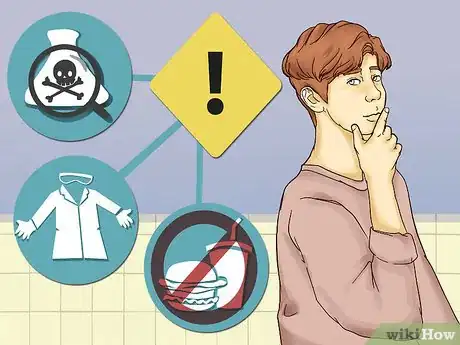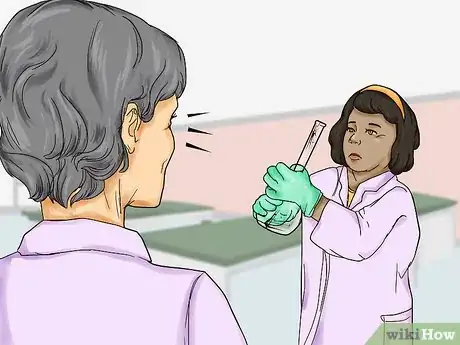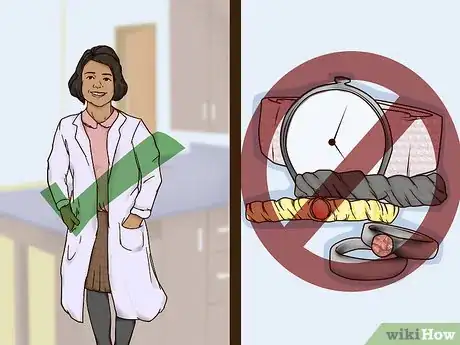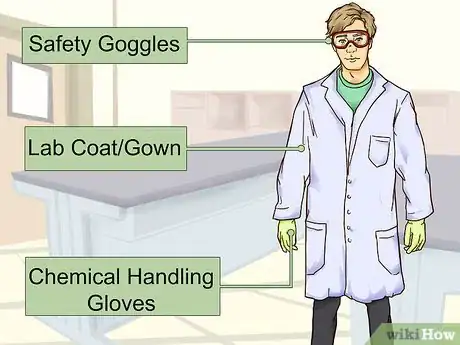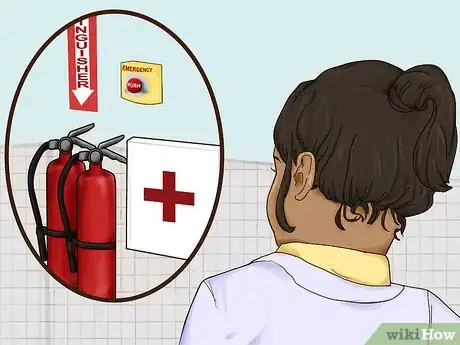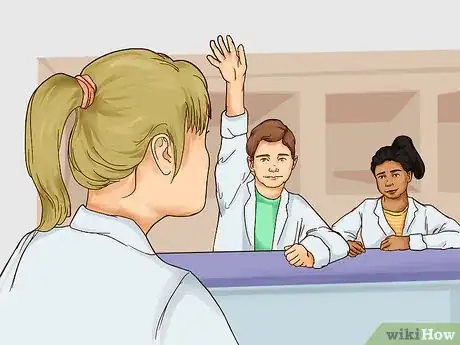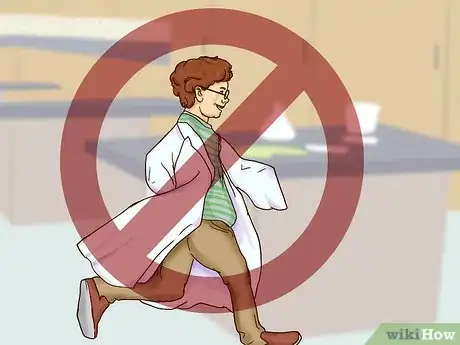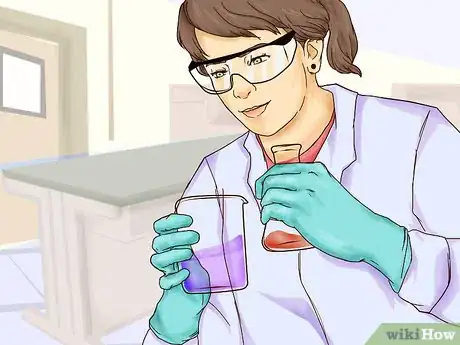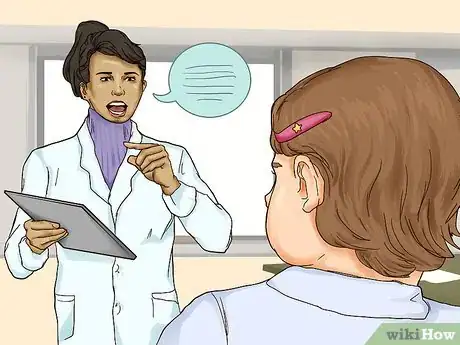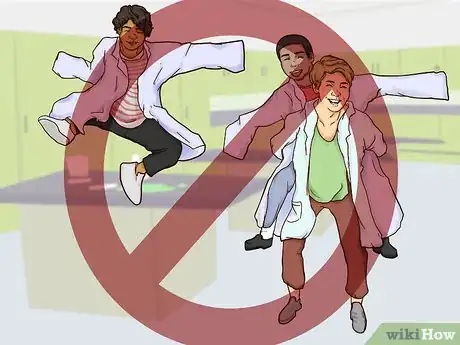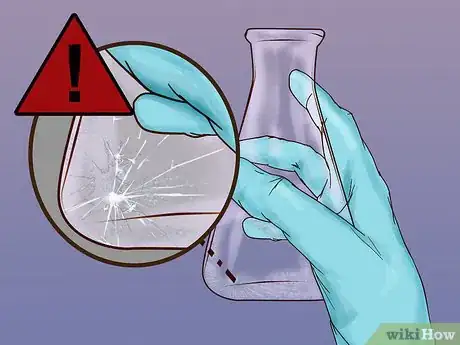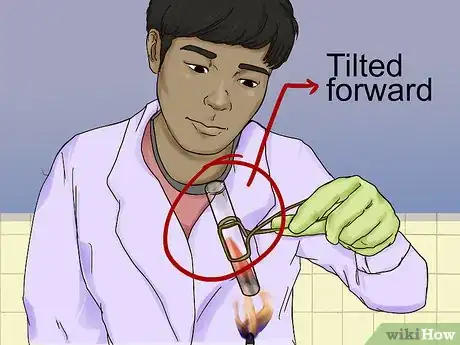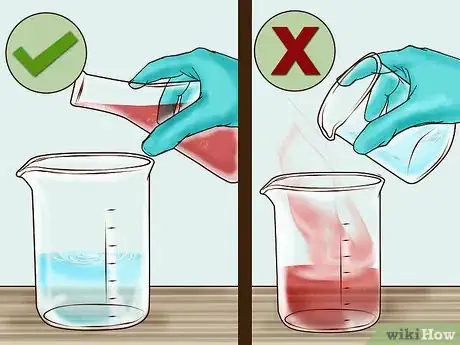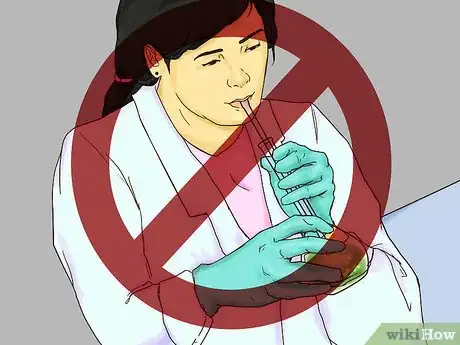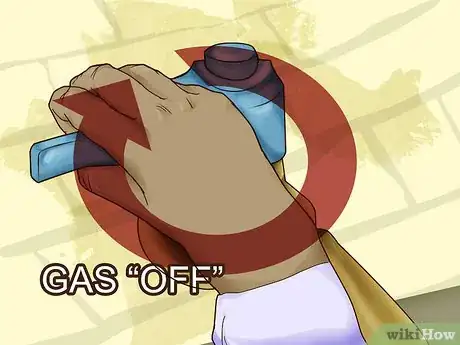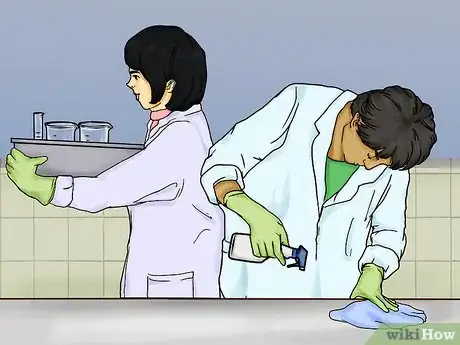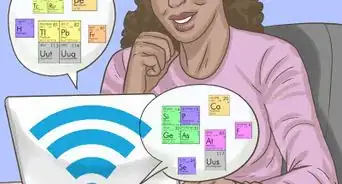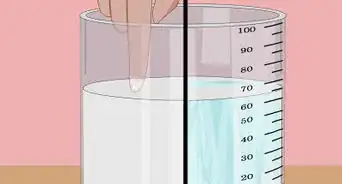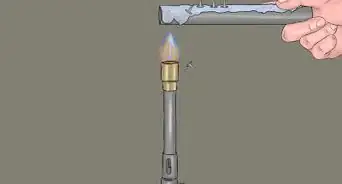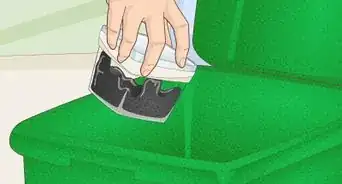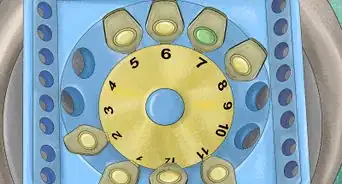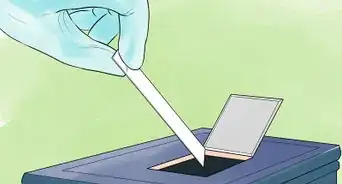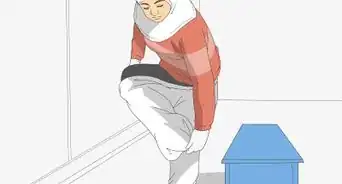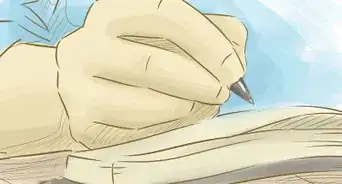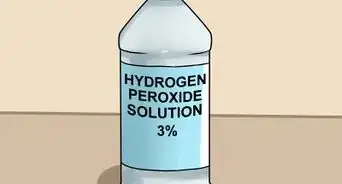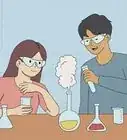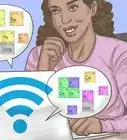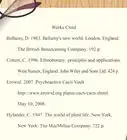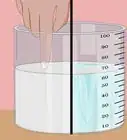X
This article was co-authored by Meredith Juncker, PhD. Meredith Juncker is a PhD candidate in Biochemistry and Molecular Biology at Louisiana State University Health Sciences Center. Her studies are focused on proteins and neurodegenerative diseases.
This article has been viewed 55,748 times.
Science labs are a place of tremendous excitement and learning, but it is important to stay safe and alert at all times. There are many hazards in a lab and it is important to be aware of all of them. Listening to your teacher and following their instructions is an essential part of behavior in your school lab. Besides learning, it is important to enjoy yourself in lab, but make sure you do it safely.
Steps
Method 1
Method 1 of 3:
Staying Safe
-
1Know about all safety procedures. If an emergency does occur, it is important that you know the correct way to act. All safety and emergency procedures should be discussed at the beginning of the school year. In addition, relevant safety measures should be reviewed before each experiment.[1]
- If you are unsure about a specific process, ask your teacher so that you will know exactly what to do.
-
2Report all spills, injuries, or broken equipment to your teacher. Immediately after a spill or breakage occurs, it must be reported to your teacher. No matter how small it may seem, your teacher needs to know so that the proper cleanup procedure can be followed.[2]
- Broken glass can have sharp edges that can lead to cuts so handle it with care. It must be disposed of in a special broken glass container.
- Never try to clean up a chemical spill without consulting your teacher first.
Advertisement -
3Dress for lab work. Do not wear bulky clothing as this will be difficult to manage and may come into contact with a flame or chemicals. Roll up your sleeves and keep long hair tied back. Wear shoes that are closed-toe, low heeled, and cover your entire foot.[3]
- Wear clothes that cover your whole body, such as long pants or a long skirt.
- Jewelry and contacts should not be worn in the lab.[4]
-
4Wear proper protective equipment (PPE). When working in a science lab, you must always wear a lab coat, gloves, and protective eyewear. The lab coat will protect you from chemical spills and gloves will protect your hands when handling chemicals or bacteria.[5]
- Eyewear should cover both your eyes and the sides of your eyes to protect from splashes.
- Disposable gloves of latex or nitrile should be used and removed before leaving the lab.
- Also, make sure to use tongs or protective gloves whenever you are handling something that might be hot. It can take a while for chemicals to cool down, so use caution.
-
5Know where to find safety equipment. Familiarize yourself with the location of any and all safety equipment which may be available, including the fire extinguisher, first aid kit, and the eyewash station. If you have access to an emergency shower, know where this is located.[6]
- You also need to know where the exits to the room are found and follow evacuation procedures quickly and quietly if needed.
Advertisement
Method 2
Method 2 of 3:
Conducting Yourself in the Lab
-
1Abide by all of the classroom rules. A school science lab is just like any other classroom and you must follow all of the rules of conduct that you would in your classroom. Respect your teacher and listen when they are talking. Raise your hand to speak or ask questions.
- Listen to all instructions before beginning any experiments.
-
2Never run in the laboratory. There are many pieces of expensive and breakable equipment in a science lab. Microscopes, spectrometers, and glassware can be knocked off the edge of a workbench if you are running around. While it may be an accident, that equipment is expensive to replace once it is broken.[7]
- Be aware of your surroundings and walk at all times when in the lab.
-
3Perform only the specified experiments. When you are in the laboratory, you are there to focus on one or two specific experiments detailed by your teacher. This is not the time or the place to go off on your own and start mixing chemicals to see what happens. Follow the instructions for the lab of the day and only do those experiments.[8]
- Performing your own experiments without supervision can be dangerous and lead to injury.
-
4Listen carefully to your teacher at all times. When working with dangerous materials, injury or accident could easily occur if directions are not followed. Your teacher knows the proper way to handle everything and expects you to learn these procedures by listening to them.
- Learn the rules specific to your lab. In school labs, you will be forbidden from eating, drinking, or chewing gum while experiments are underway.
-
5Conduct yourself in a responsible and cautious manner at all times. At no time should anyone in the lab engage in roughhousing, pushing, running, jumping, or other risky behaviors. Be aware of your surroundings and avoid knocking things off lab benches.
- Never throw anything in the lab.
- Never taste or smell any of the chemicals in the lab.
Advertisement
Method 3
Method 3 of 3:
Using Proper Laboratory Procedures
-
1Check your equipment for breakage. If you find a crack in a glass beaker or other container, dispose of the glass in the proper location. If you find a leak in a hose, get a replacement. Broken equipment is hazardous to work with and should always be replaced before starting an experiment.[9]
- Tell your teacher if you notice that some of your equipment is damaged before the lab begins.
-
2Tilt test tubes away from you. This rule is particularly important when heating the test tube. If the tube cracks or breaks the solution inside will not be splashed on you because you held the tube away from you. This is also helpful to avoid inhaling fumes that may be coming from the solution in the tube.[10]
- You should always know exactly what chemical you are working with and the hazards associated with it.
-
3Add acid to water, never water to acid. When diluting acids, never add the water to the acid. When water and acid combine the reaction releases a lot heat and can rapidly boil causing an explosion. This rapid boil explosion can splash concentrated acid onto you or those around you. As long as you always add acid to the water, you can avoid this.[11]
- A teacher should always be around to supervise when you dilute acids or bases.
-
4Never pipette by mouth. When using a suction pipette, always use the bulb of the pipette to take up the liquid. Pipetting by mouth can lead to accidental ingestion of the solution. This is particularly dangerous if the solution you are pipetting is hazardous.
- Always use the suction bulb or pump.
-
5Turn off gas and heating equipment when not in use. If you are using a Bunsen burner or a hot plate for an experiment, make sure that it gets turned off immediately after you are done using it. A hot plate looks the same hot as it does cold so be careful around this equipment. Before leaving the lab, check around and make sure everything is turned off.[12]
- Never place your hand directly on a hot plate. Hold it slightly above the plate to test the temperature.
-
6Clean your lab station before departing. At the end of every experiment, clean all of the equipment you used and wipe down the lab bench. Dispose of all chemicals properly and remove your proper protective equipment.
- Leave the lab space as clean as or cleaner than you found it for the next student.
Advertisement
Community Q&A
-
QuestionWhy do we have to stand at the lab benches when conducting hazardous experiments?
 Community AnswerIf you spill anything, you can get out the way quicker than if you are sitting as your reaction time is faster.
Community AnswerIf you spill anything, you can get out the way quicker than if you are sitting as your reaction time is faster. -
QuestionHow can I not get nervous before a practical?
 Community AnswerYou will always be a little nervous as it is natural. However, you will be much less nervous if you study well and are prepared for your exams.
Community AnswerYou will always be a little nervous as it is natural. However, you will be much less nervous if you study well and are prepared for your exams. -
QuestionWhat should I do if a student is sleeping in the lab?
 Community AnswerWake up the student gently.
Community AnswerWake up the student gently.
Advertisement
Warnings
- Never return unused chemicals to their original bottles!⧼thumbs_response⧽
- Report any accident, no matter how small or big, to your teacher without delay and don't try to clean it up yourself.⧼thumbs_response⧽
Advertisement
References
- ↑ http://www.carolina.com/teacher-resources/Document/lab-safety-instructions/tr11076.tr
- ↑ http://www.carolina.com/teacher-resources/Document/lab-safety-instructions/tr11076.tr
- ↑ http://www.carolina.com/teacher-resources/Document/lab-safety-instructions/tr11076.tr
- ↑ http://nobel.scas.bcit.ca/debeck_pt/science/safety.htm
- ↑ http://www.carolina.com/teacher-resources/Document/lab-safety-instructions/tr11076.tr
- ↑ http://www.carolina.com/teacher-resources/Document/lab-safety-instructions/tr11076.tr
- ↑ http://www.carolina.com/teacher-resources/Document/lab-safety-instructions/tr11076.tr
- ↑ http://www.carolina.com/teacher-resources/Document/lab-safety-instructions/tr11076.tr
- ↑ http://www.carolina.com/teacher-resources/Document/lab-safety-instructions/tr11076.tr
About This Article
Advertisement
